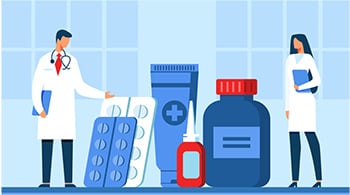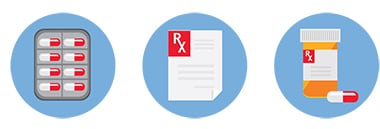Take Charge of Your Diabetes: Your Medicines
When you have diabetes, you need to take your medicines correctly to stay healthy. If you don’t, they may not work as well. The good news is that your pharmacist can help you stay on track with your medicines. You’ve already taken an important step by finding this guide!
Tips To Manage Your Medicines

Take your medicines as directed. Tell your pharmacist and your primary care doctor if:
- You develop any problems that you didn’t have before—like nausea, diarrhea, itching, or a rash.
- You have any problems taking your medicines, like forgetting to take them or having a hard time swallowing them.
- You have any changes in your diet or health.
- You are pregnant or breastfeeding.
- You are having trouble paying for your medicines.
Make a list of all of your medicines to show your pharmacist and doctor. It’s easier than trying to remember them all.
- Give a copy of your medicine list to your pharmacist and primary care doctor. Keep a copy in your wallet.
- Include medicines your doctor has prescribed for you.
- Include over-the-counter items such as vitamins, herbal supplements, natural remedies, cold medicines, or pain medicines (like aspirin or ibuprofen). Over-the-counter medicines are ones you can buy off the shelf without a prescription. They can sometimes interfere with other medicines.
Talk with your pharmacist.
- Ask questions about your medicines.
- Tell your pharmacist about any new health problems you have.
- Share any new test results you get from your dentist, eye doctor, foot doctor, or other members of your health care team.

Why Do Your Medicines Matter?
- People with diabetes often take many different medicines for diabetes and for other conditions, like heart disease, high blood pressure, and high cholesterol.
- Some medicines that are safe by themselves can mix badly with other medicines.
How Can Your Pharmacist Help You?
- Pharmacists are easy to reach. They are often available all day, in the evening, and on weekends. You can talk to them in person or call the phone number on your prescription bottle.
- Pharmacists can tell you about programs that can help you save money on medicines and help you manage your diabetes.
Questions To Ask Your Pharmacist
- What are the brand and generic (nonbrand) names of my medicines?
- What is each of my medicines for?
- When should I take each medicine and how much should I take?
- How long should I use this medicine? Can I stop using it if I feel better?
- What should I do if I miss a dose or take too much?
- What are the possible side effects?
- How should I store my medicine? Does it have to be kept in the fridge?
- Will this medicine take the place of anything I already take?
- Are there other medicines I should avoid? Are there foods, drinks, or activities that I should avoid?
Ask your health care team to help you set and reach goals to manage your blood sugar, blood pressure, and cholesterol and stop smoking—also known as the ABCs of diabetes.
- A1C (a measure of your average blood sugar over 3 months): The goal set for many people is less than 7% for this blood test, but your doctor might set a different goal for you.
- Blood pressure: High blood pressure causes heart disease. The goal is less than 140/90 mmHg for most people but check with your doctor to see what your goal should be.
- Cholesterol: LDL or “bad” cholesterol builds up and clogs your blood vessels. HDL or “good” cholesterol helps remove the “bad” cholesterol from your blood vessels. Ask your doctor what your cholesterol numbers should be.
- Smoking: If you smoke or use other tobacco products, take steps to quit. Call 1-800-QUIT-NOW (1-800-784-8669) for support.
Teach your family about your diabetes and the ABCs so they can help you.
Join the millions of Americans learning to manage their diabetes:
Ask your health care provider to refer you to diabetes self-management education and support (DSMES) services to help you manage your diabetes. Search for “Find a Diabetes Education Program in Your Area” to go to a website that lists programs recognized by the American Diabetes Association or accredited by the Association of Diabetes Care & Education Specialists.